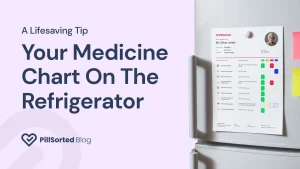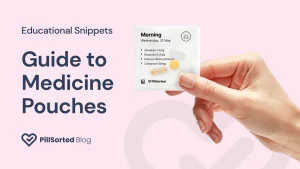Tips to Lose Weight & Reduce Fat

Weight loss can be a challenge, but there are several benefits to losing weight—not just those you’ll see in the mirror, but those you’ll experience on the inside as well. If you are overweight, losing just 5% of your body weight can decrease your risk of developing certain cancers, delay or even prevent type 2 diabetes, and ease joint pain. Read on to get our tips on how to lose weight and reduce fat safely.
Please note that the tips to lose weight in this post only apply to adults, ages 18 to 64, who are at an increased risk of developing weight-related diseases. If you are pregnant, under the age of 18, or have any dietary or mobility restrictions due to a medical condition, please consult with your pharmacist before beginning a weight-loss program.
In this post:
- Discover the many health benefits related to weight loss
- How to know if you need to lose weight
- How to calculate your BMI
- How to start losing weight
- Medicines to help you lose weight
Weight loss benefits
Losing weight in a healthy and sustainable manner can have tremendous benefits for both your physical and mental well-being. And while your results may differ based on your genetics, lifestyle, and overall health, here are some common benefits you can look forward to:
- Improved cardiovascular health—even modest weight loss is linked to significant improvements in cardiovascular disease (CVD) risk
- Improve insulin sensitivity by helping regulate blood sugar levels and reducing the risk of developing dysglycaemia (pre-diabetes or type 2 diabetes)
- Joint pain relief and decreased risk of conditions such as osteoarthritis
- Enhanced energy levels and stamina, increasing overall productivity
- Better sleep quality, less sleep apnea and less snoring
- Improved mood, self-esteem, and mental health
- Decreased risk of developing several types of cancer (e.g., breast, colon), gallbladder disease, and fatty liver disease
- Enhanced fertility, and increased chances of successful conception and a healthier pregnancy
- Reduced risk of premature death and an overall longer life expectancy
Do you need to lose weight?
Despite the many benefits of weight loss, attempting to lose weight may be harmful for some. For example, not having enough body fat is also associated with osteoporosis, infertility, and other harmful conditions.
A good, though not perfect, way to understand if you need to lose weight, or not to, is to calculate your Body Mass Index (BMI). If your BMI is 25 and above, you should consider losing weight. Just keep in mind that BMI does not differentiate between fat and muscle and while using it to describe a group of people may be helpful but, it is not as accurate for all individuals. For example, a short, muscular man in his late 20’s and a tall, less‑muscular woman in her early 50’s can have the same BMI.
Calculate your BMI:
- Divide your weight in kilograms by your height in metres squared (commonly expressed as kg/m2). Or use this BMI calculator.
- Check where your answer puts you on the BMI scale:
| BMI (kg/m^2 ) | Weight Category |
|---|---|
| Below 18.5 | Underweight |
| 18.5 to 24.9 | Healthy |
| 25.0 to 29.9 | Overweight |
| 30.0 to 39.9 | Obese |
| 40.0 or higher | Severely Obese |
How to start losing weight
A healthy reduced-calorie diet and regular exercise are the simplest way to lose weight treat and obesity.
Here are some suggestions to help you get started:
- Have lean protein—eat foods high in protein and low in fat, such as chicken, fish, eggs, yogurt, legumes, and beans, etc.).
- Fill half of your plate with non-starchy vegetables that are low in calories and carbohydrates, such as leafy greens, broccoli, bell peppers, cucumbers, etc.
- Eat smaller portions. Reducing daily calorie intake is the most important factor for weight loss.
Reducing daily calorie intake is the most important factor for weight loss.
- Drink 6 to 8 cups of water or more, daily. Did you know that dehydration can trick your body into feeling hungry?
- Do 30 minutes of moderate activity such as dancing, walking, or riding a bike, 5 days a week (150 min/week).
- Break up long periods of sitting or lying down with some activity—stretch, run up the stairs, and walk around.
Weight loss Dos & Don’ts
| Do | Don’t |
|---|---|
| Eat lean protein with every meal (chicken, fish, eggs, yogurt, etc.) | Eat a lot of highly processed foods, saturated fats and avoid trans fats, often found in fast food, fried foods, and snack food. |
| Fill half your plate with non-starchy vegetables (leafy greens, broccoli, bell peppers, cucumbers, etc.) | Don’t forget to consume protein |
| Drink 6 to 8 cups of water daily | Drink fermented or sugary beverages |
| Do 30 minutes of exercise 5 days per week (150 min/week of moderate-intensity exercise) | Forget to exercise |
| Move around after every 45 minutes of inactivity | Obsess about the scale (remember muscle weighs more than fat) |
| Consider weight loss prescription or OTC medication | Give up! |
Weight loss medicines
Tried diet and exercise, but still can’t reach your weight loss goals? If you’re living with obesity and are unable to lose weight through lifestyle and behavioural changes alone, your GP may prescribe Injectable Weight Loss Treatments such as Orlistat (Xenical), Liraglutide (Saxenda), or Semaglutide (Wegovy).
But it is important to remember that weight loss medicines are not a replacement to healthy eating and physical activity—they must work together and be tailored to your individual health condition and needs.
Weight loss medicines are not a replacementto healthy eating and physical activity
Here’s a deeper look at each of these weight loss medications:
Orlistat
Orlistat, also known as Xenical, works by blocking the absorption of 1/3 of the fat in your meals. This unabsorbed fat is then naturally eliminated from your body in your stool (faeces), which can help you lose weight and avoid gaining new weight. You usually start to notice the medication working within a few days, and by the 3-month mark, you should have lost at least 5% of your body weight. If you have been unable to lose weight after 3 months, then speak with your doctor because this may not be the best weight loss medication for you.
To qualify for an Orlistat prescription, you must:
- Have a BMI of 30kg/m^2 or more (obese)
- Or, have a BMI of 28kg/m^2 or more and at least one weight-related health condition, such as high blood pressure or diabetes
- Not be currently breastfeeding or pregnant
Liraglutide
If you are unable to take Orlistat, or you tried taking Orlistat, but it did not help you with weight loss, Liraglutide, also known as Saxenda, is another option. In clinical studies, patients taking Liraglutide in addition to eating a reduced-calorie diet and exercise counselling successfully lost more weight compared to patients who were doing diet and exercise alone.
Liraglutide works by making you feel fuller and less hungry. As a result, you’ll eat smaller meals and consume fewer calories, which leads to weight loss. This medication comes as an injection pen that your doctor will explain to you how to use to inject the medication under your skin once a day. If after 3 months, you have not lost least 5% of your body weight, then speak with your doctor because this may not be the best weight loss medication for you.
To qualify for an Liraglutide prescription, you must:
- Have a BMI of 35kg/m^2 or more
- Or, have a BMI of 32.5kg/m^2 or more and be of south Asian, Chinese, black African or African‑Caribbean origin
- Have non-diabetic hyperglycaemia (high blood sugar)
- Be at high risk for heart problems such as heart attacks and strokes, for example, because you have high blood pressure (hypertension) or high cholesterol
Semaglutide
Semaglutide, also known as Wegovy works the same way as Liraglutide, except the medication is only injected under your skin once per week . It is recommended for use in addition to a reduced-calorie diet and regular physical activity. In clinical trials, compared to placebo, Semaglutide helped patients lose an average of 12% or more of their body weight.
To qualify for an Semaglutide prescription, you must:
- Have a BMI of 35kg/m^2 and at least one weight-related health condition (e.g., pre-diabetes or type 2 diabetes, high blood pressure, high cholesterol, sleep apnea, or heart conditions (cardiovascular disease).
- Or, have a BMI between 30 and 30.49kg/m^2 and at least one weight-related health condition if you are eligible to be referred to a specialist in weight loss.

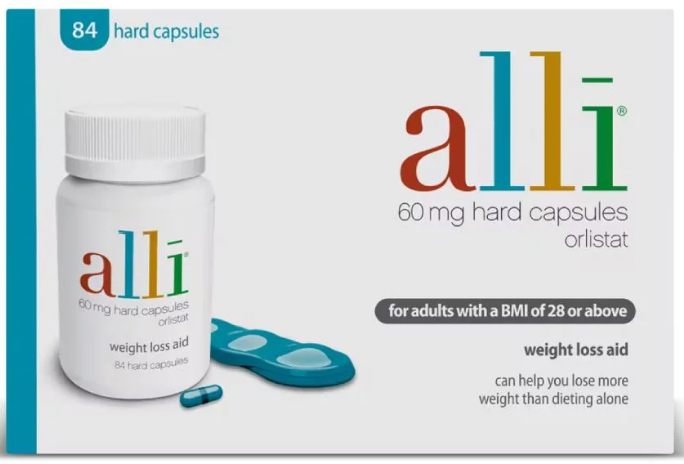
Alli Capsules 60mg – 84 Capsules
Alli Capsules are a clinically proven and non-prescription solution that goes beyond dieting alone for adults with a BMI of 28 or over and are overweight, want to lose weight, and eat healthier.
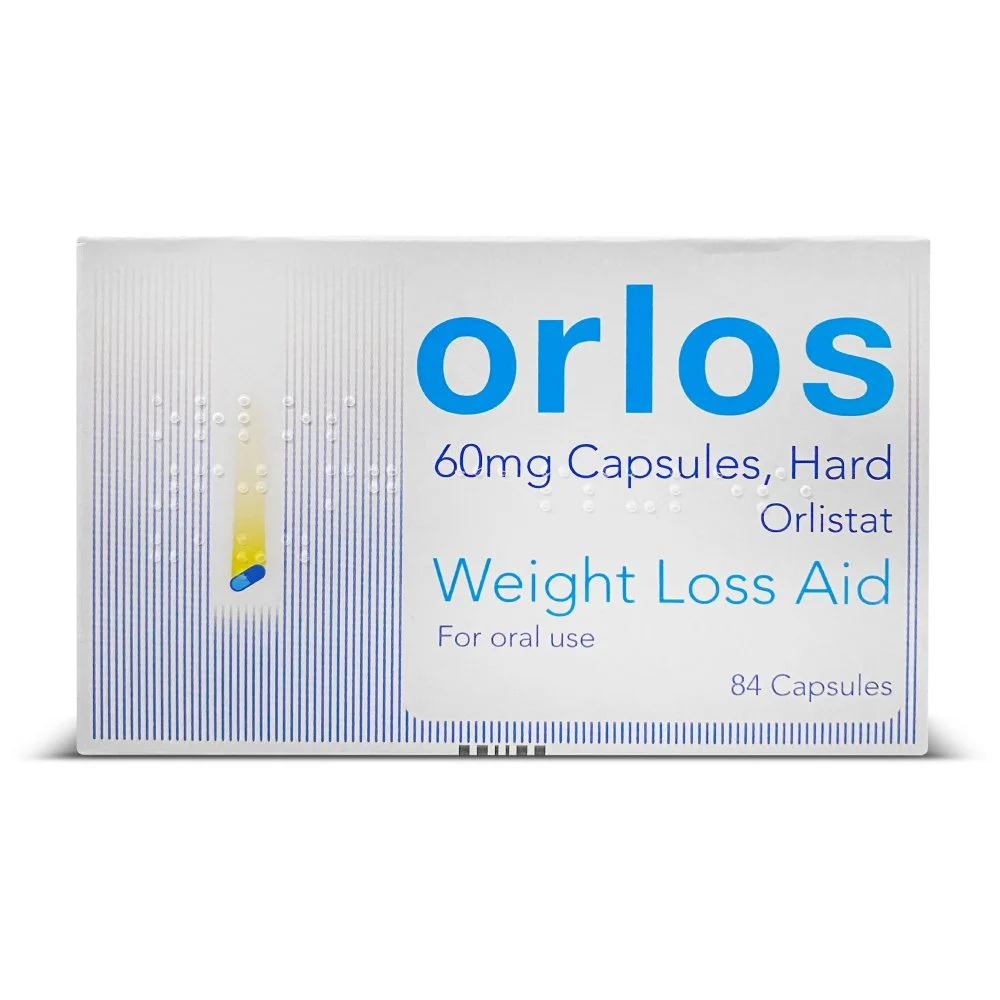
Orlos 60mg – 84 Capsules
Orlos 60mg is a weight loss medication that works best when partnered with a reduced-calorie, low-fat diet and exercise.
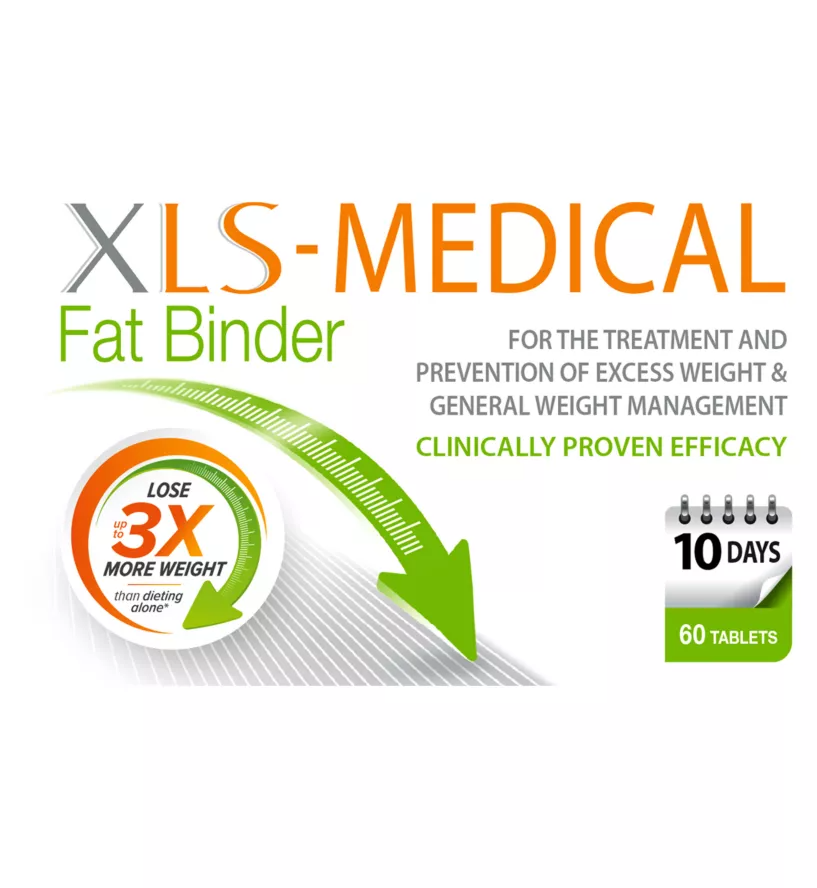
XLS Medical Fat Binder – 60 Tablets
XLS Medical Fat Binder Tablets are an effective weight loss aid that can support you in achieving significant weight loss results, surpassing the outcomes of dieting alone.

Injectable Weight Loss Treatments
GLP-1 treatments help control your appetite.
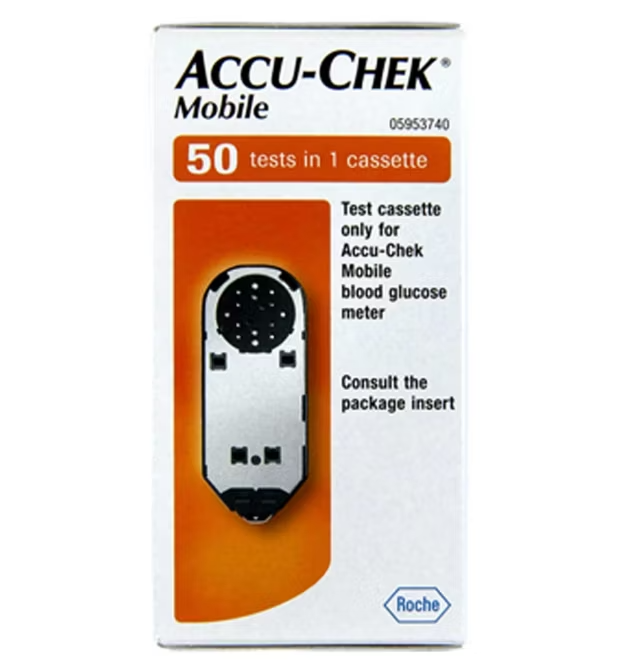
Accu-Chek Mobile Diabetes Test Strip Cassette – 50 Tests
This Accu-Check Mobile Cassette is an uncomplicated approach to measuring the glucose level in your blood without strips. Its design avoids accidental contact with the testing area, making it simpler to apply the blood. It can be used with the Accu-Chek Mobile blood glucose monitoring system (sold separately).

AeroChamber Plus
AeroChamber Plus is a medical device designed to enhance the delivery of inhaled medications, including asthma medications, to the lungs.
Key takeaways
- Losing weight in a healthy and sustainable manner can have tremendous benefits for both your physical and mental well-being.
- Even modest weight loss is linked to significant improvements in cardiovascular disease (CVD) risk.
- If your BMI is 25.0 and above, you should consider losing weight.
- A healthy reduced-calorie diet and regular exercise are the simplest way to lose weight and treat obesity.
- Weight loss medicines are an option to help people who have not been able to lose weight by diet and exercise alone.
References
Pati, S., et al (2023). Cancers (Basel). Obesity and Cancer: A Current Overview of Epidemiology, Pathogenesis, Outcomes, and Management
Wing, R., et al (2011). Diabetes Care. Benefits of Modest Weight Loss in Improving Cardiovascular Risk Factors in Overweight and Obese Individuals With Type 2 Diabetes
Kim, J., (2021). J Obes Metab Syndr. Optimal Diet Strategies for Weight Loss and Weight Loss Maintenance
View Other References (2)
Cox, C. (2017). Diabetes Spectr. Role of Physical Activity for Weight Loss and Weight Maintenance
Tak, Y., et al (2021) Curr Obes Rep. Long-Term Efficacy and Safety of Anti-Obesity Treatment: Where Do We Stand?
PillSorted
PillSorted is a full service pharmacy that delivers trusted pharmacy products, over-the counter medications, and the prescriptions your doctor recommends, directly to your door. Your PillSorted pharmacist is happy to answer your questions about weight loss and potential treatment options at 0333 4050380 or help@pillsorted.com.
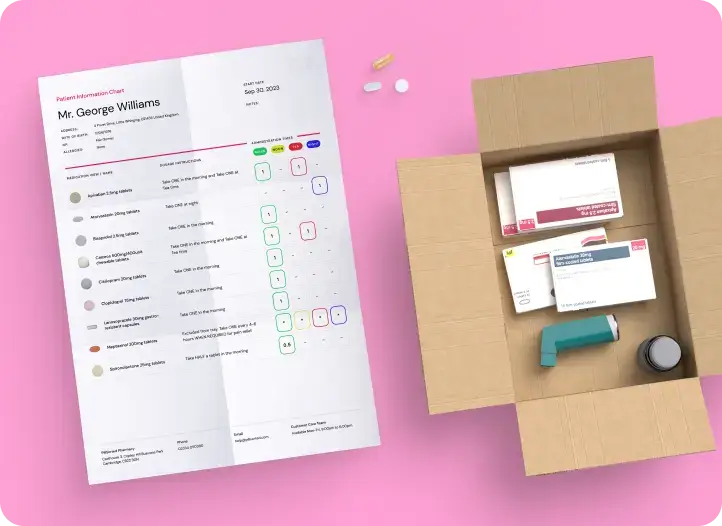
All third-party trademarks (including logos and icons) referenced by PillSorted remain the property of their respective owners. Unless specifically identified as such, PillSorted’s use of third party trademarks does not indicate or imply any relationship, sponsorship or endorsement between PillSorted and the owners of these trademarks.





















